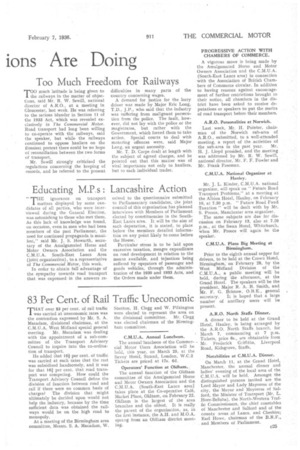Too Much Freedom for Railways
Page 79

If you've noticed an error in this article please click here to report it so we can fix it.
T00 much latitude is being given to the railways in the matter of objections, said Mr.' R. W. Sewill, national director of A.R.O., at a meeting in Gloucester, last week. He was referring to the serious blunder in Section 11 of the 1933 Act, which was revealed exclusively in The Commercial Motor. Road transport had long been willing to co-operate with the railways, said the speaker, but while the railways continued to oppose hauliers on the flimsiest pretext there could be no hope of reconciliation between the two forms of transport.
Mr. Sewill strongly criticized the regulations concerning the keeping of records, and he referred to the present difficulties in many parts of the country concerning wages.
A demand for justice for the lorry driver was made by Major Eric Long, T.D., J.P., who said that the industry was suffering from malignant persecution from the police. The fault, however, did not lay with the police or the magistrates, but rather with the Government, which forced them to take action. Special courts to deal with motoring offences were, said Major Long, an urgent necessity.
Mr. T. D. Corpe dealt at length with the subject of agreed charges, and he pointed out that this matter was of vital importance not only to hauliers, but to each individual trader.




































































































































































